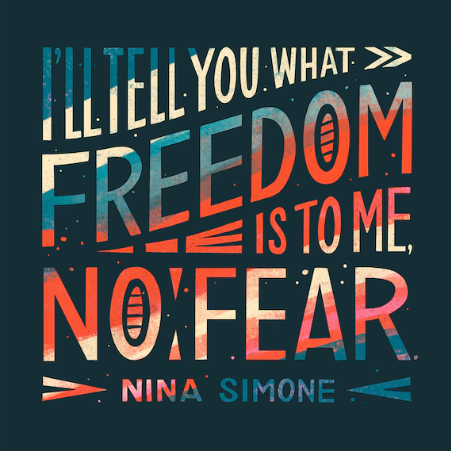EDITOR’S NOTE: Given the state of federal government and the 4th of July holiday, I took a prompt that NPR sent out to readers “What does Freedom Mean to You?” and sent it to the couple dozen Pioneer contributors. We’ll share those thoughts with readers over the next several days.
Here’s a powerful message from LaNicia Duke. Watch for more from LaNicia as she breaks down the recent “Big, Beautiful Bill” and it’s impacts. Readers, please share with us – “What does freedom mean to you?” Share it words, poetry, photos, art … I think we all need to remind ourselves about what freedom truly means. Send your contributions to editor@tillamookcountypioneer.net
By: LaNicia Duke
“I’ll tell you what freedom is to me: no fear.”
That line from Nina Simone has stayed with me for years. It’s not just a poetic phrase—it’s a whole sermon. A definition that cuts through surface-level celebrations and speaks to the soul.
When I was asked to write about what it means to be a U.S. citizen and celebrate our independence, I knew my answer wouldn’t echo traditional patriotism or nationalism. I don’t knock anyone who finds their identity in being American first. But that’s not my truth.
We often talk about freedom like it’s a shared experience. But even the ideals we call universal—like freedom of speech—don’t mean the same thing to everyone. The First Amendment may guarantee free expression, but how that plays out depends on who’s speaking, what’s being said, and where it’s said. We say we believe in free speech, but the truth is, we constantly debate what kinds of speech are “appropriate” and who gets to speak freely without consequences.
When I first heard Nina Simone define freedom as “no fear,” something in me clicked. How can anyone be free while living in fear?
For much of my life, I lived in fear. Fear of not being accepted. Fear of saying the wrong thing. Fear that people would leave me, judge me, or write me off. I was afraid I’d never be enough. And under it all, I feared that the grace I heard about in church wouldn’t apply to me.
That’s not freedom.
I now see fear as a form of energy—one that’s stagnant, toxic, and non-renewable. It doesn’t evolve or adapt. It just drains. Fear suffocates possibility. Fear triggers anxiety, depression, apathy, and a distorted sense of who we are. It keeps us stuck in mental and emotional prisons.
Citizenship alone doesn’t set you free. This isn’t a criticism of America—it’s just the truth. You can live under the Constitution and still feel bound by fear, shame, or trauma. Being American is part of my journey, but it doesn’t define who I am or where my value comes from.
I’ve wrestled with what it means to belong—to this country, to this identity. I could’ve been born anywhere in the world. Was it luck? Purpose? Chance? Whatever it was, being American is part of my story, but it’s not the foundation of my identity. It doesn’t define my values or determine my worth.
And I know some folks will read this and say I’m being un-American. I’ve heard it before: “If you don’t like it here, go back to where you came from.” That’s their prerogative. But I’m not writing this to be agreeable. I’m writing it because I used to believe that my freedom depended on other people’s approval—especially growing up as a preacher’s kid. I thought I had to act, believe, and speak a certain way to be accepted, to be loved, even to be considered “Christian”.
But after nearly a decade of therapy, I made peace with my past. I redefined what truth means for me. I discovered a personal relationship with God not shaped by fear or tradition, but by personal experience. And that’s where I found true freedom. Not in someone else’s version of me—but in who I believe God created me to be. Not in what others think is valuable—but in how God sees and values me.
Choosing freedom over fear has changed everything. I celebrate my freedom daily—not through fireworks or flags, but in how I live, how I love, and how I show up in the world. I choose to be free from other people’s expectations. I choose to live free in my mind.
If the only acceptable expression of freedom is parades, cookouts, and flag-waving, then we’ve missed the point. Real freedom can’t be confined to a single holiday or uniform way of being. Freedom defined by public approval will always be conditional.
Because I am American, I claim the right to define freedom on my own terms. I get to decide what gives my life meaning, purpose, and worth. And I believe the world is better off for it—because instead of seeing myself as a reflection of a “good” American, I see myself as a reflection of God.
LaNicia Duke is a writer, speaker, and community leader based in Central Oregon. She uses storytelling, faith, and real-life experience to help people connect, reflect, and take action in their everyday lives. She works across rural communities to support conversations that matter.


